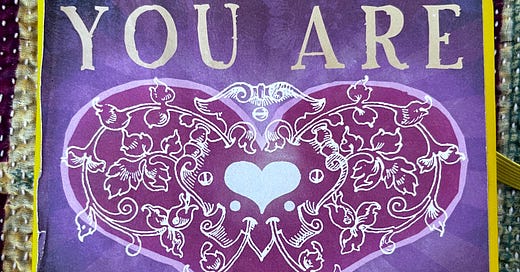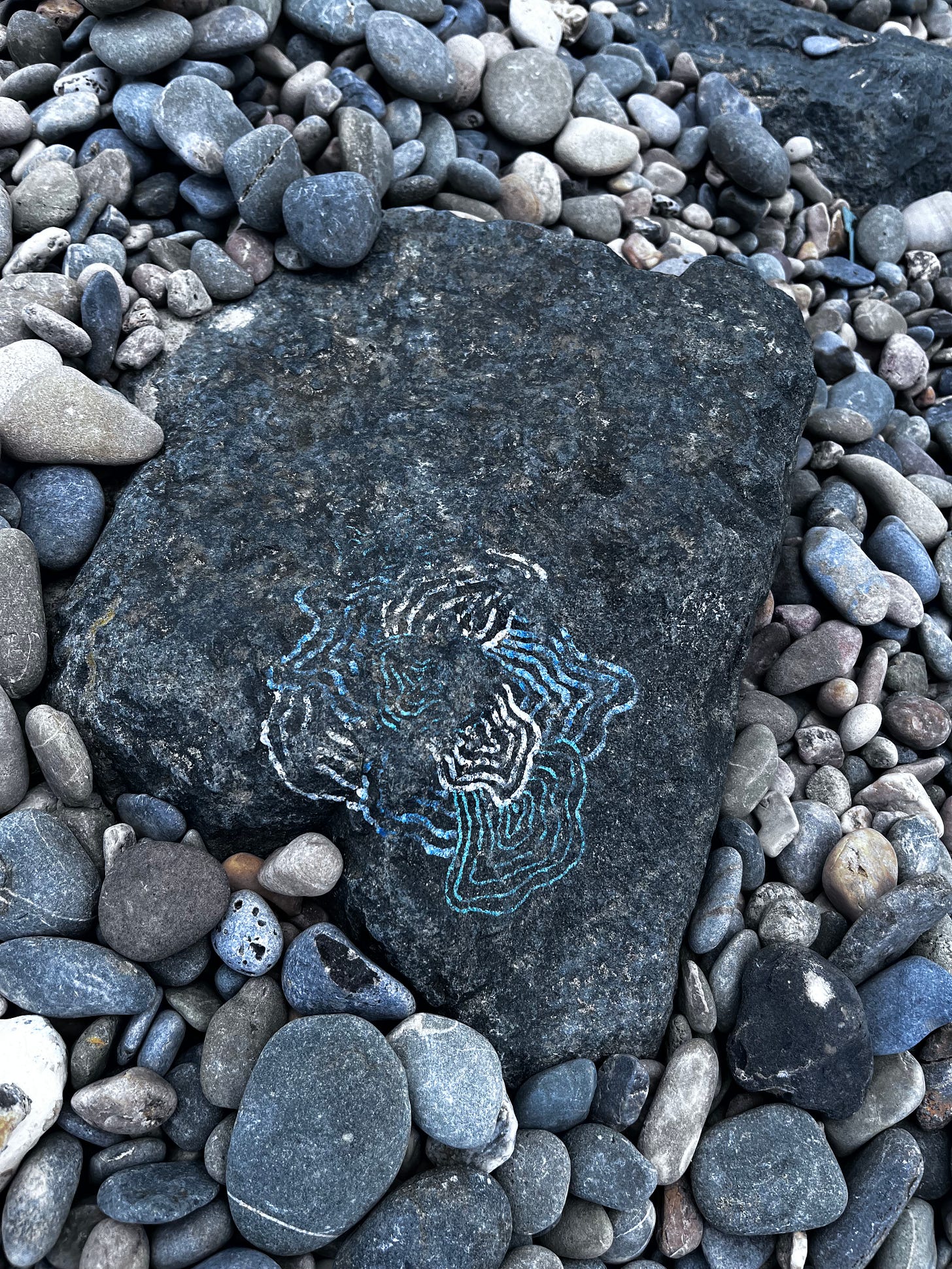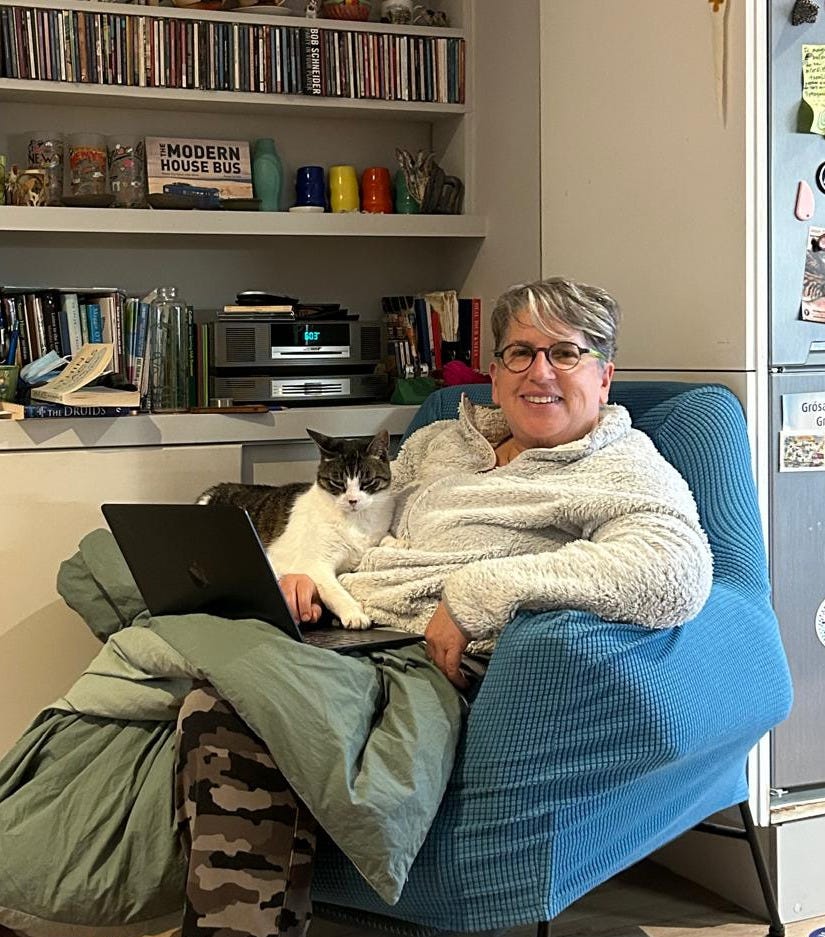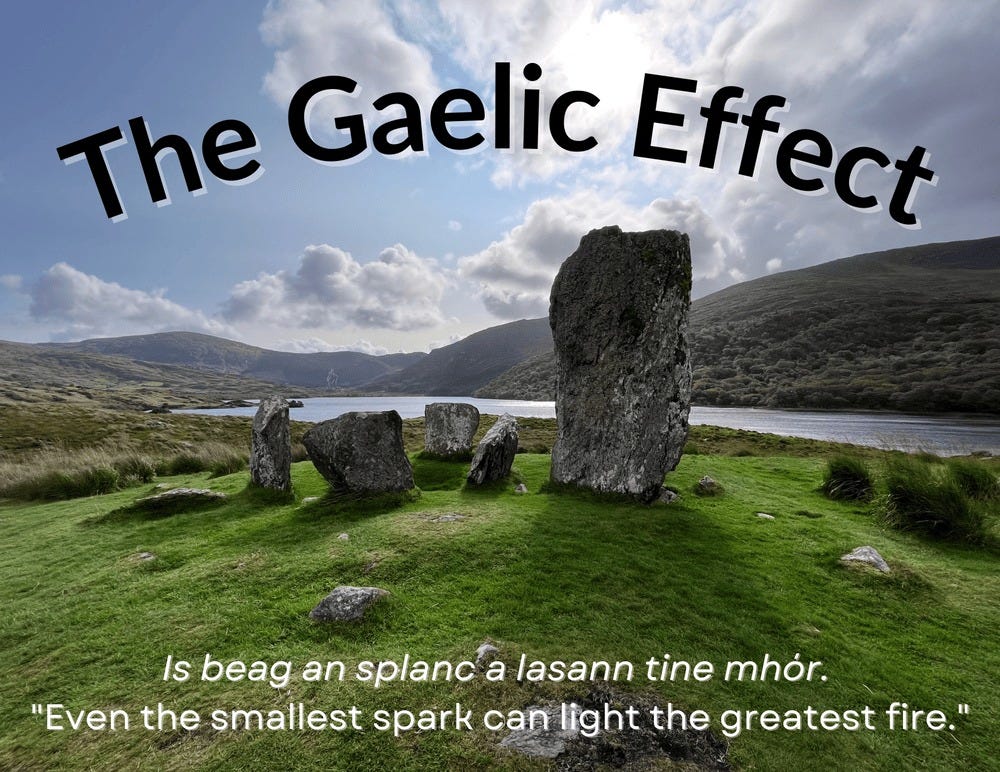First, a celebration! The literary Substack the Auraist has chosen The Gaelic Effect for its list of recommendations.
, the Auraist also believes “in supporting the work of high-quality Substackers.” I am honored to make their list. (Yes, I feel loved!)And congratulations arís (again) to the paid subscribers who won a copy of Effie Brush’s beautiful art book. A big “thank you” to all supporters.
This week is the one year birthday of The Gaelic Effect. Be on the look out for some special news.
And now, this week’s Gaelic Effect…
Love and presence
In the last few weeks I’ve been thinking a lot about love and presence. It’s not surprising. As many of you know, after months of being ill, my feline companion Séamus passed a month ago. Over the last four months, I also broke up with a long-time partner. I say “over the last four months” because—like birth and most deaths—it’s been a process. As much as love and presence, I’ve been thinking about life and death. Presence increasingly seems to me life, in its fullest form.
All this leads me to the Irish word neart—which means power, strength, ability and abundance—yet so much more.
“Whatever some hypocritical ministers of government may say about it, power is the greatest of all pleasures. It seems to me that only love can beat it, and love is a happy illness that can't be picked up as easily as a Ministry.” [Stendhal, de l'Amour, 1822] (Etymonline)
In English, “power” primarily means “the ability or capacity to do something or act in a particular way” or “the capacity or ability to direct or influence the behavior of others or the course of events.” (Oxford Languages) The etymology, from Anglo-French, pouair, literally meant “to be able to.” (Etymonline) So we have personal power, political power, power of the people, horsepower, and of course, wind and solar power and “power plays.” Yet this word originally had more to do with power-over—militarily and in control over others. Going back to c. 1300, it meant specifically "…vigor, might, especially in battle” and “control, mastery, lordship, dominion, ability or right to command or control,“ “legal power or authority; authorization” or “military force, an army.” (Etymonline) Since the 1980s, “empowerment” has taken on a meaning of personal development. Yet going back to the 1650s, it meant to “give power or authority to, to authorize by law.”(Etymonline)
So once again—I can’t make this up!—there’s a troubling history to an English word that, on the surface, appears neutral or mundane (see for example What’s Love Got to Do with It? about “husband” and “wife”). Personally, I am not able to think about “power” without thinking about British colonialism. Which came first? “Being able to” meaning to wield military might and authoritarian control—or actually using power in this way over other people and cultures? I believe the thinking—the belief system inherent in the language/culture—came first. “Being able to” (and having power) does not inherently mean using force over others. Yet in English, this is the historical meaning of the word.
“…language requires context in order to function as communication between speakers and listeners. As listeners, we make use of background knowledge—about the speaker, about entities and concepts, about previous utterances—in order to infer the speaker’s intended meaning.”—Measuring the Importance of Context
Abundance or nuance?
This past week I was discussing with Mollie how there are fewer words in Irish than English. English is thought to have more words than any other language, some say close to a million (Richest in Words). Yet it’s hard to count exactly because many words have multiple meanings depending if a verb, noun, or adjective. Also, in English, there’s a high prevalence of phrasal verbs (verb + preposition) that change the base meaning of the word. “Put on,” for example, means something very different than “put away” or “put off” or “put down.” “Put down” also has a literal meaning (“I put the book down”) and a metaphorical meaning, to insult or denigrate someone. In English, there are more technical and scientific terms (that most speakers don’t even know or use everyday) and more specialized words. You could say, “a chair without a back.” In English, we have “chair” and “stool.” Words for everyday things (mother, father, brother, water, stool, etc). come from German (mutter, vater, bruder, wasser, stuhl—which in German actually means chair!). Thanks to the Norman Conquest, the more specific (and sophisticated) words in English come from French. You can “cook” (German, kochen, ultimately from Latin) but all the fancy words for cooking in English come from the Normans: baste, saute, fricassee, etc. English, as a “bastard” language of mixed parentage, has more words as a result. (Not that I have anything against mixed parentage!)
“…successful interpretation is dependent on our ability to make use of knowledge beyond the words themselves. … language is fully embedded within its context, the conditions of its generation with respect to participants and environment.” —Measuring the Importance of Context
Less is more
Irish is estimated to have about 50,000 words. Yet this does not mean less richness or complexity. In French, ciel can mean “sky,” “heaven” and also “blue.” All three add to the collective meaning of the word. In Irish, the word for “power,” neart, also has several meanings, each enriching the others. Neart means “might,” “mightiness,” “strength,” “force,” “ability” and “power. ” Yet it also has the meaning of abundance, of “bounteousness” and “plenty.” Whenever you say “plenty” in English (“plenty” of people, time, money, opportunity, tasks to be done, etc), in Irish you say neart: neart ama (plenty of time), neart deiseanna (plenty of opportunities), neart airgid (plenty of money), neart teannaidh (plenty of resources), etc. (Teanglann) I like in Irish how there’s not just “plenty” of something; there’s a force and mightiness to it—a powerful amount. You are empowered by time, wealth and opportunities—and even the tasks on your to-do list. “Plenty” gives us the ability or resources to do something (the power to do it); Irish reminds us of this directly, via neart.
Consistent with abundance connected to power, in Irish you also say someone is at their “best” by saying they are in their neart (tá sé ina neart = he is in his power, i.e., at his best). Inversely, if something can’t be helped, there’s níl neart (no strength or power). “I can’t help it” or “there’s nothing I can do about it” is níl aon neart agam air—literally, I have no strength over it. (About Irish)
Neart also means“sinew.” A sinew is “a piece of tough fibrous tissue uniting muscle to bone; a tendon or ligament.” (Oxford) In effect, it’s what allows us to use our strength. Without sinew (neart), our muscles would be ineffective in moving or holding our bodies together; we would have no physical power/empowerment. Extending from these meanings, neart also means fortitude. How do you have fortitude or determination without strength or sinew? It makes sense that neart holds all these meanings; the word itself (in all its uses) teaches us what power really is.
Ní neart go cur le chéile
“Unity is strength.” This is how the seanfhocal (proverb) above is usually translated. Literally in Irish it means, “There is no strength (neart) without togetherness/being with each other (le chéile).” Yet it takes on a whole other level of richness when you understand the nuanced meanings of neart and le chéile. There is a lot to say about “togetherness” (being with the other: le chéile) in Irish and Irish culture. I’ve written two different essays about it (see Being Together), including how it connects with the concept of the meitheal and the clachan (see Sheltering Each Other) and how many idiomatic expressions use le chéile. “Unity” for me is more about solidarity and coherence—taking a collective stance or line of action. Le chéile is different: it’s about being with the other; being there for the other. It’s about relationship, relationality and interdependence. That is very different from unity.
Thanks to neart in this proverb, togetherness is not just “strength.” It’s might, power, abundance and fortitude; it’s our very sinew. Just as sinew holds our bodies together and allows our strength to act (engaging our muscles), le chéile (togetherness) is the sinew of society and human survival. Research increasingly shows how it was human empathy and cooperation (collective and mutual interdependence and support) that led to our survival as a species and our thriving (see The Empathic Civilization). There is something simple, lyrical and profound in that neart means “sinew” and not “muscle.” In stark contrast to English and its historical meaning of “power,” the Irish language implicitly understands where (real) strength comes from: connection.
May you be fully in your neart (strength, power and abundance),
Dian, i mBaile Átha Cliath (in Dublin)
You can also support The Gaelic Effect and its mission by making a one-time donation by clicking anseo (here).










Ahh, go raibh míle maith agat Dian! I have spent the past couple of weeks since reading "Don't Should on Me", re-shaping my words (in English) to reflect "what's right" for a person or situation. I can already see how I'll be using "power" differently from now on, or at the very least using it more intentionally with a new understanding. A poet friend of mine is so very conscious of the sinewy might of words, she'll never say, "we lost power," she'll take the trouble to say, "the electricity's gone out". I'll be sharing this article with her posthaste.
Great article. English has a lot of words for to "lie" too, to dress it up all nice and clean. I like the directness of bréag. Sometimes you just have to call a bréag a bréag.